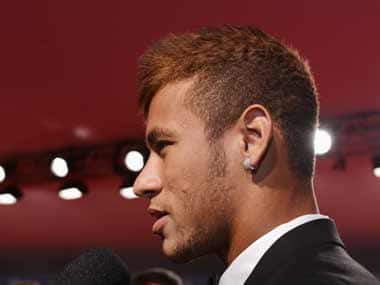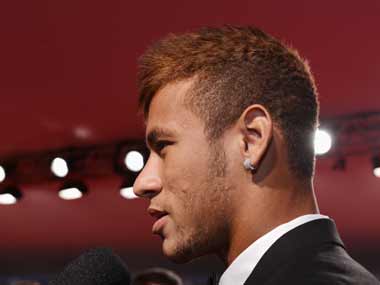Less than two weeks ago, in an interview with global news broadcaster CNN, Barcelona centre-back Gerard Pique spoke of what FC Barcelona meant to the region of Catalonia. “I think for Catalonia, FC Barcelona means a lot because it is one of the top clubs in the world and that means that it’s a way to show what Catalonia is in the world,” Pique said. Pique’s grandfather Amador Bernabeu served as Director of FC Barcelona for 23 years. The 26-year-old has expressed his desire to one day become president of the club, whose anthem is the only song he knows by heart. One wonders then if Barcelona’s transfer bosses were singing from the same hymn sheet. Less than a week ago, Barcelona were found guilty of underreporting the amount of money they’d paid for Neymar. Having originally claimed that the Brazilian superstar’s move to the Camp Nou was worth 57 million Euros, documents submitted to the Spanish government as part of the club’s financial audit showed that he was in fact worth a whopping 86.2 million Euros instead. [caption id=“attachment_1368665” align=“alignleft” width=“380”]  Less than a week ago, Barcelona were found guilty of underreporting the amount of money they’d paid for Neymar. Getty Images[/caption] When prompted to provide an explanation for this devaluation on paper, Barcelona were quick to respond. Transfer director Raul Sanllehi has said that the transfer on its own had cost 57.1 million euros. This included a 17.1 million euro fee to Santos and 40 million euros as a “compensation fee” paid to a company owned by Neymar’s parents. However, he also detailed “other payments” around the transfer such as a signing bonus of 10 million euros and “various other fees” paid to the family that took the total cost to 86.2 million. These “other payments” involve (allegedly) a 2.6 million commission to his father, another two million for yet another company owned by his father to look for new talent, and four million Euros for Brazilian companies to look for commercial partnerships with Barcelona. A further nine million euros was allocated for two friendlies with Santos, with another contract to another Neymar-owned company for 2.5 million euros which will apparently be used to redevelop football pitches in Rio de Janeiro’s slums. It all started pretty innocuously: Barcelona fan Jordi Cases wanted to know why 40 million Euros had been paid to Neymar’s reps, N&N, the agency that owns a portion of Neymar’s commercial rights, when match-day tickets at the club were so prohibitively expensive. N&N – in case you’re wondering – are the names of his parents, Neymar da Silva Sr. and Nadine. It was only when the club refused to respond to his query with an answer that he filed a complaint with the Spanish courts. That there were shady dealings going on at the Camp Nou are now all but certain: why else would Sandro Rosell resign as club President, surely one of the most prestigious roles in the world of football. Rosell stepped down after claiming his family had been threatened, adding that he wanted to “protect the club’s image”. If indeed all of this had been Barcelona’s initial plan, why did they not say it openly? The reason is clear: taxation. If Barcelona had conducted their dealings the right way, Rosell would have no reason to vacate his post because he’d know whatever he’d done was legal. Currently, all football clubs in Spain are taxed a flat 52% on whatever transfer dealings they undertake. If indeed the Neymar transaction had cost a hundred million euros, it would mean a cool 45 million for the club to fork out only as tax and Barcelona are already 571 million Euros in debt. So complex is the representational structure constructed around Neymar in order to gain maximum profit from him that my head hurts while writing this article. “The case with Neymar is complex, with many different investors owning a portion of the player,” writes Chris Lesley of the Sports Agent Blog. “His club Santos owned 55%, DIS Esporte owned 40%, and TEISA owned the remaining 5%. “The breakdown of the €57m looks straightforward,” he continues. “However, Barcelona paid an upfront fee of €10m last year, directly to Santos. On top of this, a €30m fee was paid to the player himself.” “This leaves €17m to be distributed among investors. Under this model DIS Esporte received €9.6m. The investment company is claiming they are entitled to 40% of the full €57 million, which is the total amount paid in transfer fees for the player.” In addition, Neymar’s agent is Wagner Ribeiro, his image his handled by Ronaldo’s newly formed advertising company 9ine and the Doyen Group handles his merchandising. All it takes is one of these individuals to pull out of the Neymar deal to collapse. It is therefore quite plausible to suggest that all of these payments that Barcelona have made are indeed disguised fees to all these parties. Barcelona claim that Ribeiro only received 5% of the total 57 million as his fee, but when Neymar has so many people taking their cut from his financial activities, surely Ribeiro would want a larger piece of the pie? What adds credence to that is FIFA’s revelation on agent fees during the previous year. “More than a quarter of all international transfer fees in 2012 were paid to agents and intermediaries,” writes Owen Gibson of The Guardian. It’s not just superstars who command such immense transfer fees that are followed by a gaggle of people waiting to cash in on their exploits. For example, Demba Ba, who signed for Chelsea during Rafael Benitez’s time at the club, moved for £7 million, but that move from Newcastle was only given the green light after his agent received a £2 million commission. “Signing fancy foreigners is a great way to make a little money on the side,” writes well known football writer Raphael Honigstein in his ESPN column. “Whether it’s $2 million, $3 million or $5 million: who really knows what an Ecuadorian winger is objectively worth, and who cares? “Exotic deals with added layers of inscrutability - i.e., third party ownership - provide the perfect vehicle for kick-backs”. Rosell is right when he says that the reputation of the club is important. Barcelona have always carefully tried to cultivate the image of a collectivist club, of players stepping away from the spotlight and sacrificing personal glory for the sake of the club. They portray themselves as the club of the people, which because of Spain’s turbulent past, rings true: the Camp Nou was considered a symbol of the people’s revolution against Spanish dictator Francisco Franco during the 1930s in Spain, which led to them being called mes que un club. Not so in the Spanish capital. Not only are Real Madrid unafraid of spending vast sums of money when the occasion demands it, they also speak about it openly to play up their status as one of the world’s wealthiest old-money clubs. Brand Real Madrid is all about extravagance and that has gone some way in adding to Barcelona’s populist image. But then again, it’s not the first time that Barcelona have sunk to such depths in order to get the players they’ve wanted. Few will forget the manner in which they attempted to re-sign Cesc Fabregas in the summer of 2010. Even before the transfer season began, Barcelona’s players and management used the media in an attempt to tap up Fabregas, who was with Arsenal at the time. Akin to a propaganda machine, few were the days during that summer when Barcelona did not speak about Fabregas’ return to his boyhood club. Arsenal manager Arsene Wenger rightly likened their assault on his club’s captain as ‘noise’ and called Barcelona disrespectful since FIFA rules clearly state that no club can tap up another club’s player. “I know how things happen,” he said at the time of Barcelona breaking FIFA’s tapping-up rules. “It doesn’t necessarily go through the player or the agent but I think it is a rule that has to be reviewed. It’s not really respected.” “I am really pissed off with Barcelona and all that nonsense,” said then Arsenal chairman Peter Hill-Wood at the time. “It is not the first time they have done this and it is a most disrespectful and tiresome thing to do. “You would think there would be some action you could take against them, but I suppose you cannot stop the man shooting his mouth off.” What Barcelona have done here is clearly unethical. Attempting to hoodwink the Spanish authorities, the myriad numbers of companies that will approach them for business deals and worse still, their fans, was something that was always going to come back to haunt them. How will fans like Jordi Cases feel the next time they go to see their heroes play, knowing that the club they support has to resort to such underhand measures to get players and has lied through its teeth to those that matter? Barcelona might play this down to exploiting loopholes in the system, but the excuse that they did it because everybody else did will not hold much water, especially since clubs like Barcelona’s standards are meant to have a conscience because of what they represent. Hallowed the club may may be, but players and companies are sure to approach Barca with a certain wariness the next time they meet Josip Maria Bartomeu, Rosell’s successor. Because truth be told, the damage has already been done, and although it may not seem that way on the surface, Barcelona’s transfer of Neymar will come back to haunt them. It is only a matter of time.
How will fans like Jordi Cases feel the next time they go to see their heroes play, knowing that the club they support has to resort to such underhand measures to get players and has lied through its teeth to those that matter?
Advertisement
End of Article
Written by Gautam Viswanathan
Gautam Viswanathan has a very simple dream: he wants to commentate at the finals of the 2022 World Cup in Qatar. A die hard football fan, Gautam's love for the game borders on the fanatical. Give him a choice between an all-expenses paid trip to Europe and Champions League final tickets and he will choose the latter without the slightest flicker of hesitation. see more


)
)
)
)
)
)
)
)
)



